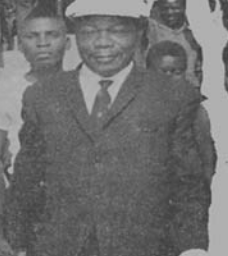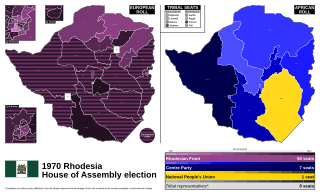
Northern Rhodesia was a British protectorate in Southern Africa, now the independent country of Zambia. It was formed in 1911 by amalgamating the two earlier protectorates of Barotziland-North-Western Rhodesia and North-Eastern Rhodesia. It was initially administered, as were the two earlier protectorates, by the British South Africa Company (BSAC), a chartered company, on behalf of the British Government. From 1924, it was administered by the British Government as a protectorate, under similar conditions to other British-administered protectorates, and the special provisions required when it was administered by BSAC were terminated.

The Rhodesian Front (RF) was a conservative political party in Southern Rhodesia, subsequently known as Rhodesia. Formed in March 1962 by white Rhodesians opposed to decolonisation and majority rule, it won that December's general election and subsequently spearheaded the country's Unilateral Declaration of Independence (UDI) from the Federation of Rhodesia and Nyasaland in 1965, remaining the ruling party and upholding white minority rule through the majority of the Bush War until 1979. Initially led by Winston Field, the party was led through most of its lifetime by co-founder Ian Smith. Following the end of the Bush War and the country's reconstitution as Zimbabwe, it changed its name to the Republican Front in 1981.

Sir Roland "Roy" Welensky was a Northern Rhodesian politician and the second and last Prime Minister of the Federation of Rhodesia and Nyasaland.

The United Federal Party (UFP) was a political party in the Federation of Rhodesia and Nyasaland.

The United National Independence Party (UNIP) is a political party in Zambia. It governed the country from 1964 to 1991 under the socialist presidency of Kenneth Kaunda, and was the sole legal party in the country between 1973 and 1990. On 4 April 2021, Bishop Trevor Mwamba was elected President of UNIP.

Elections in Zambia take place within the framework of a multi-party democracy and a presidential system. The President and National Assembly are simultaneously elected for five-year terms.

Sir Edgar Cuthbert Fremantle Whitehead, was a Rhodesian politician and statesman who served as Prime Minister of Southern Rhodesia from 1958 to 1962. He had a long and varied political career, serving as a longstanding member of the Southern Rhodesian Legislative Assembly and in a variety of minister posts over the course of nearly three decades. simultaneously serving in a variety of government position posts. His work was frequently interrupted by recurring health problems; he suffered from poor eyesight and later experienced deafness whilst in office. An ally of Sir Roy Welensky, he was Prime Minister of Southern Rhodesia from 1958 to 1962. His government was defeated in the 1962 general election by the Rhodesian Front.

Elections in Southern Rhodesia were used from 1899 to 1923 to elect part of the Legislative Council and from 1924 to elect the whole of the Legislative Assembly which governed the colony. Since the granting of self-government in 1923, Southern Rhodesia used the Westminster parliamentary system as its basis of government. The Political party that had most of the seats in the Legislative Assembly became the government. The person in charge of this bloc was the Premier, later renamed Prime Minister, who then chose his cabinet from his elected colleagues.

Rhodesia had limited democracy in the sense that it had the Westminster parliamentary system with multiple political parties contesting the seats in parliament, but as the voting was dominated by the White settler minority, and Black Africans only had a minority level of representation at that time, it was regarded internationally as a racist country. It is thus an example of a state which practiced herrenvolk democracy.

General elections were held in Southern Rhodesia on 14 December 1962 to elect 65 members of the Legislative Assembly. The election was notable for bringing to power the Rhodesian Front, initially under Winston Field, which set the colony on the course for its eventual Unilateral Declaration of Independence.
Ahrn Palley was an independent politician in Rhodesia who criticised the Smith administration and the Unilateral Declaration of Independence. Ian Smith described him as "one of the most able politicians this country has produced, and although our political philosophies did not coincide, we always respected one another and maintained friendly relations."

Harry Mwaanga Nkumbula was a Zambian nationalist leader involved in the movement for the independence of Northern Rhodesia, as Zambia was known until the end of British rule in 1964. He was born in the village of Maala in the Namwala district of Zambia's southern province. He was the youngest of three children and the only son.

General elections were held in Rhodesia on 10 April 1970. They were the first elections to take place under the revised, republican constitution. The country had declared itself independent in November 1965, shortly after the previous elections; the Rhodesian Front government had always disliked the 1961 constitution and made sure to change it by the time of the next one.

General elections were held in Northern Rhodesia on 20 and 21 January 1964. There were two voter rolls for the Legislative Council, a main roll that elected 65 seats, and a reserved roll that elected 10. Africans elected the main roll, whilst Europeans elected the reserve roll. Other ethnicities were allowed to choose which roll to be part of. The United National Independence Party won the elections, taking 55 of the common roll seats. Its leader, Kenneth Kaunda became Prime Minister, leading the country to independence in October that year, at which point he became President. Voter turnout was 94.8% for the main roll and 74.1% for the reserved roll.

General elections were held in Northern Rhodesia on 30 October 1962, with by-elections for several seats held on 10 December. Although the United Federal Party won the most seats in the Legislative Council, and Northern Rhodesian African National Congress leader Harry Nkumbula had made a secret electoral pact with the UFP, Nkumbula decided to form a government with the United National Independence Party.

General elections were held in Southern Rhodesia on 5 June 1958 for the seats in the Southern Rhodesian Legislative Assembly. Although the Dominion Party received the most votes, the result was a victory for the ruling United Federal Party, which won 17 seats. The revived United Rhodesia Party under the leadership of former Prime Minister Sir Garfield Todd failed to win a single seat.

The modern political history of Zimbabwe starts with the arrival of white people to what was dubbed Southern Rhodesia in the 1890s. The country was initially run by an administrator appointed by the British South Africa Company. The prime ministerial role was first created in October 1923, when the country achieved responsible government, with Sir Charles Coghlan as its first Premier. The third premier, George Mitchell, renamed the post prime minister in 1933.
Sir Cecil Dennistoun Burney, 3rd Baronet was a British businessman and politician in Zambia (1959-1970), having emigrated in 1951 but returning to Britain in 1970.
Federal elections were held in the Federation of Rhodesia and Nyasaland on 12 November 1958. The result was a victory for the ruling United Federal Party, with Roy Welensky remaining Prime Minister.
The Dominion Party was a political party in the Federation of Rhodesia and Nyasaland, led by Winston Field.











